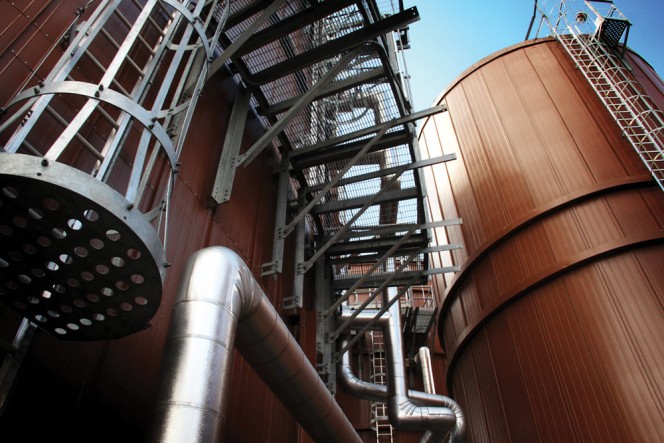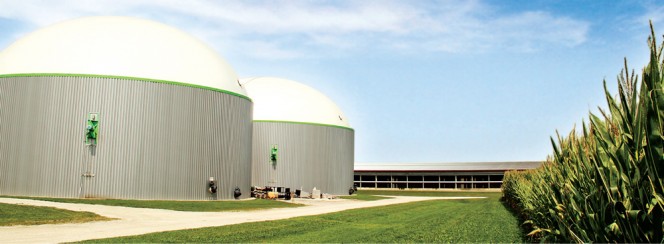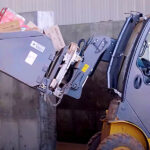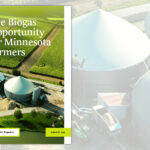A recent survey of Wisconsin’s biogas industry — which includes 172 anaerobic digesters —highlights challenges and solutions needed to advance biogas facility development.
Clinton Fandrich and Amanda Mott
BioCycle September 2015

Forest County Potawatomi Community, Milwaukee, Wisconsin
Photo courtesy of Wisconsin State Energy Office
Wisconsin boasts one of the highest number of anaerobic digester (AD) systems in the United States, with 172 digesters covering a variety of sectors, sizes, operational approaches, and system applications. A recent survey conducted by the Wisconsin State Energy Office (SEO) provides a comprehensive assessment of the Wisconsin biogas industry. Altogether, these facilities produce millions of Btus in heat energy, generate 140 MW of electrical capacity and offset thousands of gallons of diesel fuel per year.
But the survey went further than simply identifying the current output of Wisconsin’s biogas systems, striving to answer critical questions about the development of the state’s anaerobic digester industry, such as what are the primary operational challenges, what are the key financial barriers to project development, and where are the opportunities for greater progress.
Biogas Industry Challenges
The survey responses outlined four primary challenges to system operation and development of the biogas industry as a whole:
1. Cost-effective and safe operation of electricity generators, which is particularly important as power generation has been relied upon for a primary source of project revenue.
2. Intersector collaboration and information sharing has been lacking, leading to conflicts over organic waste resources and appropriate project siting.
3. Generating revenue for a biogas project has recently become more challenging, which has led many in the industry to assess possibilities to generate revenue outside of power generation, such as renewable natural gas and compressed natural gas (CNG).
4. Establishing effective system operation and maintenance procedures, which are particularly challenging for agricultural systems.
Still other challenges exist, such as environmental regulatory compliance, establishing fair tipping fees, and unavailable capital for project financing. However, these are intimately connected to the four primary challenges outlined above and may be addressed in concert.
Electricity Generation
The failure of AD system design to protect electrical generation equipment quickly rose to the top of the list, with survey participants pointing to ineffective or absent biogas cleaning mechanisms to extract impurities that can harm the generator equipment. This presents tough questions about how system developers and builders design these often very complex projects, but also allows for establishment of novel alliances in system design going forward.
Intersector Collaboration And Information Sharing
Those surveyed further identified lacking collaboration between the four main biogas industry sectors (farms, wastewater treatment plants, landfills, and industrial facilities) which, they asserted, inhibits information sharing that could allow the industry to, for example, better utilize available feedstock and collaborate to resolve operation and maintenance concerns. This evoked intriguing discussions about information sharing methods that Wisconsin’s biogas industry can utilize to resolve these difficulties in order to maintain its leadership status in the United States.
Revenue Generation
The ability of AD systems to generate revenue was a close third in the industry challenges expressed in the survey. In the past, electrical power generation was a very popular way for AD projects to generate revenue in Wisconsin. This strategy relied heavily on the state’s renewable portfolio standard, which required all Wisconsin electric providers to provide their retail electricity customers with 10 percent of electricity generated from renewable resources by 2015. This resulted in favorable power purchase agreements (PPAs) for biogas facilities. Since the major investor-owned utilities (IOUs) in the state met this standard in 2013, utilities have not been offering increased tariffs for renewable generation for quite some time.
System Operation And Maintenance
Not only does AD system operation and maintenance require revenue, it also requires specialty training and knowledge. As such, system operation and maintenance has proven to be a large challenge in and of itself. Operators are often consumed by other tasks either on the farm or at the factory and are unable to dedicate the required time and resources to properly maintain and operate the equipment. In some cases, as noted, systems lack the necessary biogas cleaning components to enable safe operation of the generators, leading to heavy maintenance requirements and sometimes a dramatic reduction in the operational life of the equipment.
Solutions And Opportunities
Put together, these challenges present opportunities that could streamline the industry and diversify how biogas facilities are built and operated. While each potential solution could go a long way to improve certain aspects of an AD system, the challenges they address are complex and require equally complex strategies to overcome them.
Electricity Generation
Several potential solutions to generator concerns were forthcoming from survey respondents, including a requirement to allocate equal capital expense for biogas scrubbing as for electricity generation and contracting with an outside operator to conduct operation and regular maintenance of the generator equipment. The discussion about biogas scrubbing equipment also highlighted the importance of incorporating one or more techniques that were effective in removing specific contaminants and polishing the biogas to ensure safe combustion in a generator.
Several farm operations also detailed the advantages of outside contracting for operation and maintenance of the AD system (in addition to the generator). Dedicated, highly-trained operators could service the system while the farmer or the plant manager attends to his or her daily responsibilities and could justify a more aggressive maintenance schedule for key system components, including generators. These dedicated contractors could also be shared between several facilities thus reducing costs for individual system owners.
Intersector Collaboration And Information Sharing
Improving cooperation and collaboration between biogas industry sectors and individual facilities was common on respondents’ wish list. Improved collaboration was suggested to address and find potential solutions to common problems encountered across the various sectors of the industry. Additionally, such collaboration would allow for a combined voice to organize and lobby for policy changes. But much more practically, survey respondents felt that improved collaboration could help alleviate problems stemming from unfair or uneven distribution of organic waste resources. More robust information exchange within the industry could allow them to more cost-effectively process organic waste in their area. This information could also be valuable for determining the best location for new projects and where the current biogas infrastructure is operating under capacity.
The SEO is dedicated to providing a forum through which AD facility owners and operators, along with developers and engineers, can meet to discuss the barriers they face and coordinate initiatives to resolve unsettled challenges and disputes. On November 12, 2015, the second annual Wisconsin Biogas Conference will convene in Appleton to address concerns raised in the survey, as well as hear from leading policymakers in the state to discuss industry development going forward.
Revenue Generation
Having fulfilled their obligations under the current RPS, Wisconsin’s power companies have scaled back the price per kWh offered to new biogas project developers. This has all but frozen biogas project development in Wisconsin, but developers are looking to other potential revenue sources as the next step in the industry’s development.
One such possibility is development of compressed natural gas (CNG) infrastructure in Wisconsin and the conversion of key commercial trucking and municipal vehicle fleets. Many in Wisconsin’s biogas industry are deeply involved with one or another commercial trucking fleet, be it milk and dairy products transportation or municipal waste hauling. Providing these fleets with a steady, reliable, more economical and renewable fuel source that is generated at the very locations they service could be an enormous cost-saving opportunity for all. Biogas facilities owned by two local governments in Wisconsin, for example, have developed successful CNG projects fueling their municipal fleets with renewable CNG at a significant cost savings. A similar arrangement at dairy farm and industry facilities could provide system operators an additional revenue source besides electricity generation and supply their associated commercial truckers with low-cost fuel to get them to their next stop. While renewable CNG development is an exciting opportunity, perhaps more simple applications for biogas exist onsite, such as generating heat to offset costs of space and water heating, a particularly valuable proposition in food processing industries and agriculture.
System Operation and Maintenance
Survey respondents who relied on dedicated outside firms to operate and/or maintain their systems were less likely to experience significant operational challenges. Further development of the biogas system services industry could bring jobs and stimulate economic development in rural Wisconsin communities.
Another significant opportunity presented by the survey remains the construction and coordination of community digesters. Survey responses seemed to highlight several avenues for the potential structure and function of community digesters: a central point to process a diverse organic waste stream, including dairy manure, food waste, industrial organic waste, and municipal waste; a central point to process biogas and refine it into useful products, including renewable natural gas, CNG, and electricity; or some combination of both. While these outputs are important, community digesters also present opportunities to reduce the cost to waste producers and biogas facility operators by reducing the financial and operational responsibilities they would carry by sustaining their own complete system, including operations and maintenance staff.
Solutions To Other Significant Challenges
Other challenges, like environmental regulatory compliance, fair tipping fees and availability of capital financing are mostly addressed by one or more solutions outlined in this article. Concerns about environmental regulatory compliance may be reduced through more active collaboration with other biogas industry partners to collectively engage regulators and reach out to members of the community about the environmental benefits of anaerobic digestion. Again, greater collaboration and information sharing regarding the availability of organic waste could reduce the strain some operators feel in securing revenue for their systems through tipping fees. And generally improving the operation, production, efficiency and economics of the biogas industry as a whole through these and other suggestions will allay the skepticism of financiers and free up capital for new system development.
Altogether, there are significant challenges remaining to ensure the sustainable and economical operation of biogas facilities in Wisconsin, but there are highly successful operating projects to learn from and emulate. And the potential benefits are simply too impressive to ignore. More robust intersector collaboration within Wisconsin’s biogas industry can make anaerobic digestion much more cost-effective and allow the benefits of these systems to be more widely distributed. CNG infrastructure development can introduce massive new revenue opportunities for system operators and their associated industry partners alike. And finally, contracting with a dedicated system operator may make agricultural systems more palatable, which could dramatically expand biogas output in Wisconsin.
Clinton Fandrich is a bioenergy analyst with the Wisconsin State Energy Office (SEO), which invests in Wisconsin by promoting energy related economic development and jobs, increasing energy efficiency, and developing renewable and alternative energy sources. Amanda Mott has worked as the Energy Projects Specialist for the Wisconsin State Energy Office, and currently focuses on relocation work related to eminent domain.














